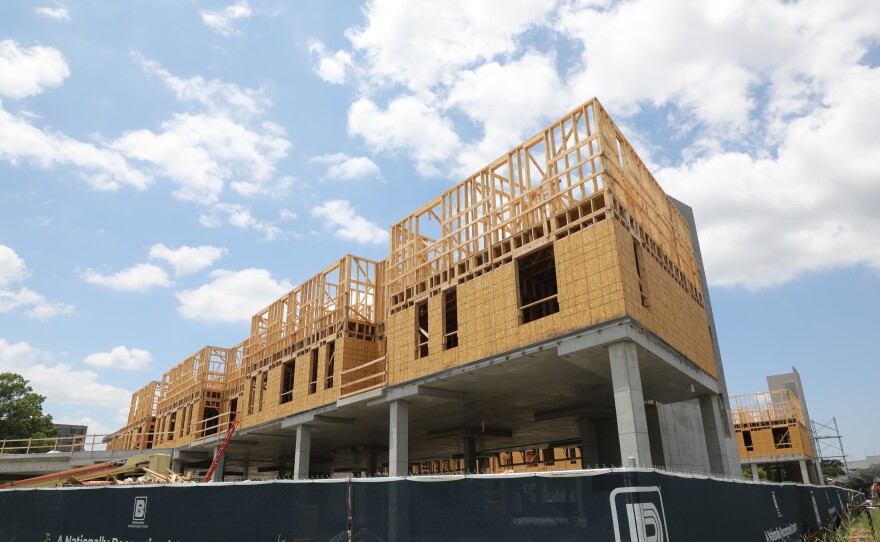This story was reported by WHRO News.
When Gillian Pressman moved to Hampton Roads from San Francisco last year, she was excited about living somewhere with less expensive housing than the notoriously pricey Bay Area.
“I was like ‘Oh, goody, an affordable area of the country.’ And it’s just not,” Pressman said.
A WHRO analysis previously found that Hampton Roads is less affordable than places like Richmond or the Washington, D.C., suburbs, primarily due to a mismatch between wages and housing costs.
But there are also barriers to building more housing, which many experts said would decrease costs by increasing supply. Norfolk’s housing study, for example, pointed to residents who resist development in their neighborhoods as a stumbling block for affordable development.
Pressman is part of a new group aiming to counter that attitude. YIMBY Hampton Roads invites development where it sees need and pushes local governments to do their part to make housing more affordable.
Pressman recently discussed the group, its latest efforts and how officials are responding.
The following has been edited for length and clarity.
Ryan Murphy: Let's start with a question I'm sure you get a lot: What the heck is a "YIMBY?"
Gillian Pressman: YIMBY is in contrast to NIMBY — so, ‘not in my backyard.’
Oftentimes, when we talk about housing, nobody wants people to be homeless, for example. They think that we should have enough housing for everyone who needs it. I think people, in theory, [think] we should be building abundant housing, so that every person looking to buy a home, every person looking to rent has ample choices; and those choices are affordable and those choices are near their job and they're near opportunity and they're near fun stuff to do. People like all of those things, in theory. People are like, "Yes, that sounds like a great idea."
Where the rubber meets the road is when somebody says, ‘OK, I got a permit to build housing, and I'm showing up next door to you in your backyard. And I'm building this housing, and there's going to be construction, and that's noisy. And then, there's also going to be change. There's also going to be new people moving into your neighborhood."
I think a lot of people feel scared of that or threatened by that. That's where "not in my backyard" comes from, where people are like, We love housing, just not here."
We need to actively counter that. So, we're "YIMBY," which stands for "yes, in my backyard." We're people who are so enchanted by all the tremendous benefits of building new housing, we're like, "Yes, we do want housing everywhere, including in our own backyards."
You've just rolled out this new campaign, the Fight for 50,000. What's that about?
So, 50,000 refers to the housing shortage that's estimated in Hampton Roads. We need to build 50,000 more homes, and how is it going to happen? It's actually not that complicated because when we actually look at the policies, there's so many policies in place that make it extremely difficult to build housing, and almost impossible to build multifamily housing.
We have made it really difficult or impossible to build that kind of housing ... and there's some really easy fixes.
Your group is recommending cities revise their rules to make it easier and more economical to build residential — things like reducing parking minimums for apartments or loosening lot-size requirements to make it easier to build smaller homes. What kind of response are you getting?
GP: People, I think, like these ideas in theory, and they're excited about them. They certainly want the benefits of abundant housing. They certainly want more affordability and more vibrancy and all the great things that happen.
They also don't want to feel like everyone in the community hates them and they're going to lose their seat. They also don't want the political pushback.
So, that's why this is not just an issue of policy. This is an issue of politics. And our job as a YIMBY movement is to make it clear to those policymakers that, not only is this a good idea, and this is good for our community, but we also need to make it clear that this is popular. That there are going to be people who resist, but those people are the minority. And the vast majority of people are excited about this, will show up to those hearings, will vote, will put in the legwork to support the politics of YIMBYs and people who want to stick their neck out for housing.
What sort of impacts are you seeing on the ground from this housing shortage?
We did tabling at an event, and people just kept coming up to us and saying, "Oh my gosh, it's taken so long for me to find a place to live. I have to live with roommates that I don't want to live with. My rent is outrageous. I wish I could buy a home but I really can't buy a home."
We're just hearing [of] a real affordability crunch, and that's a big shame, especially in this region, because we do have jobs and we do have opportunity here.
But, you know, there's jobs and opportunity and other places, too. And so, if we're not making it affordable for people to access the opportunities here, they're going to move — young workers, young families. It's not going to be helpful for the economy.


